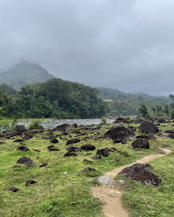Improving land governance

Improving land governance
- Our Objective
This project aims to deepen understanding of the context surrounding land and natural resource governance in and around Madagascar’s Masoala National Park, in order to support solutions that address the root causes of unsustainable development and reduce pressure on the park and its buffer zone.
- Figures
The project was launched on April 1, 2024 and is currently in progress.
Summary
For generations, the Mahalevona Valley has been a place where people and nature coexist—though not always in harmony. Nestled at the edge of Madagascar's Masoala National Park, this biodiverse region faces ongoing deforestation as young farmers clear land for cultivation, often lacking viable alternatives. At the same time, global commodities such as vanilla and clove offer economic opportunities for more sustainable income through agroforestry. Yet conflicting interests and fragmented land governance continue to hinder both conservation efforts and the development of sustainable agriculture.
To help chart a more sustainable path, the project builds a clearer picture of how land and natural resources are accessed and managed. It brings together knowledge on land tenure, works with local authorities to align practices with national policies, and co-develops land management plans with stakeholders. A central focus is to clarify and strengthen customary land practices so that younger generations can access land securely: reducing pressure to expand into forested areas and supporting more resilient communities and ecosystems.
Project Connections
- Part of the solutionscape
Building environmental justice in a remote global biodiversity hotspot
Team
- Project contactProject contact
Dr. Ntsiva Andriatsitohaina
Associated Senior Researcher
Other Projects in this Solutionscape
Co-designing knowledge for environmental justice in Masoala
Co-designing knowledge for environmental justice in MasoalaInnovations for stimulating nature-positive livelihoods
Innovations for stimulating nature-positive livelihoods


